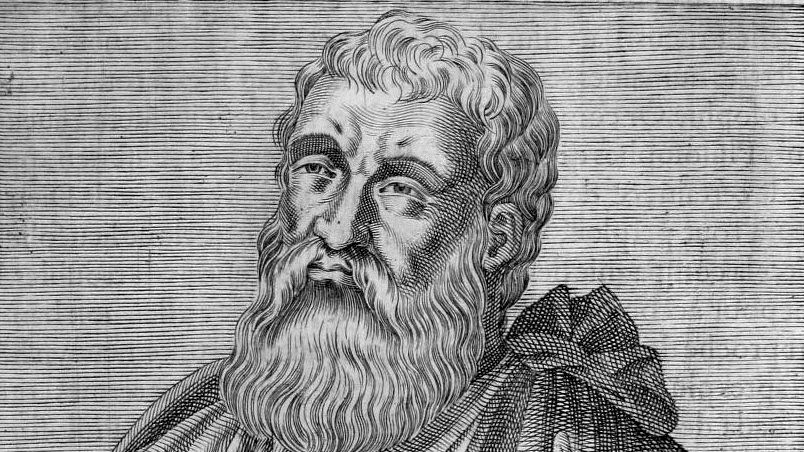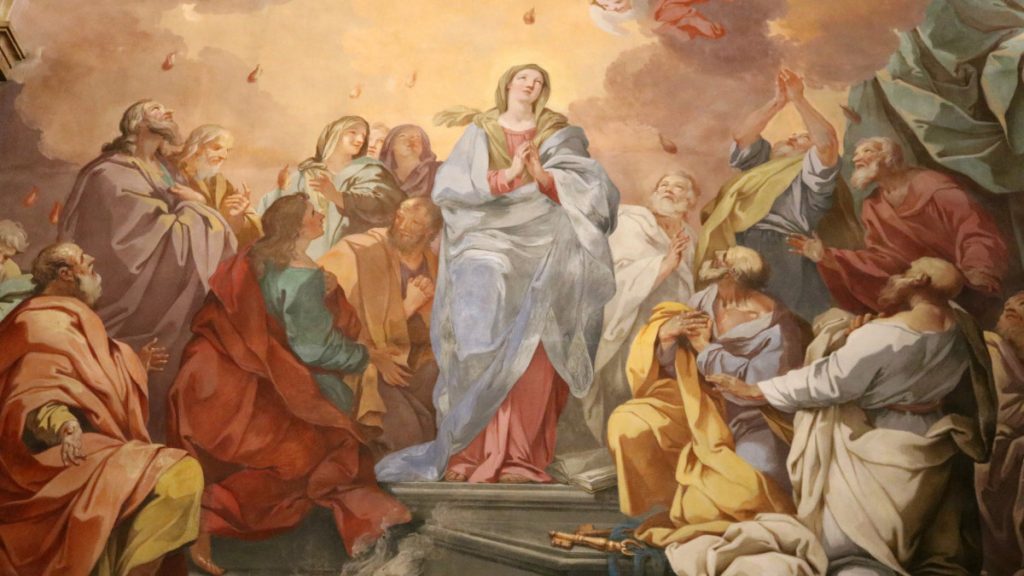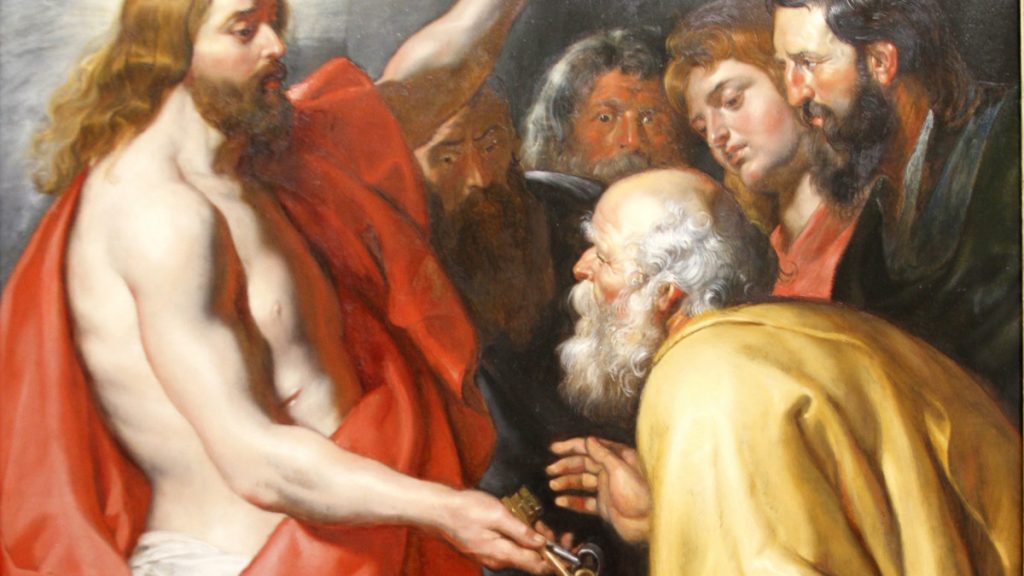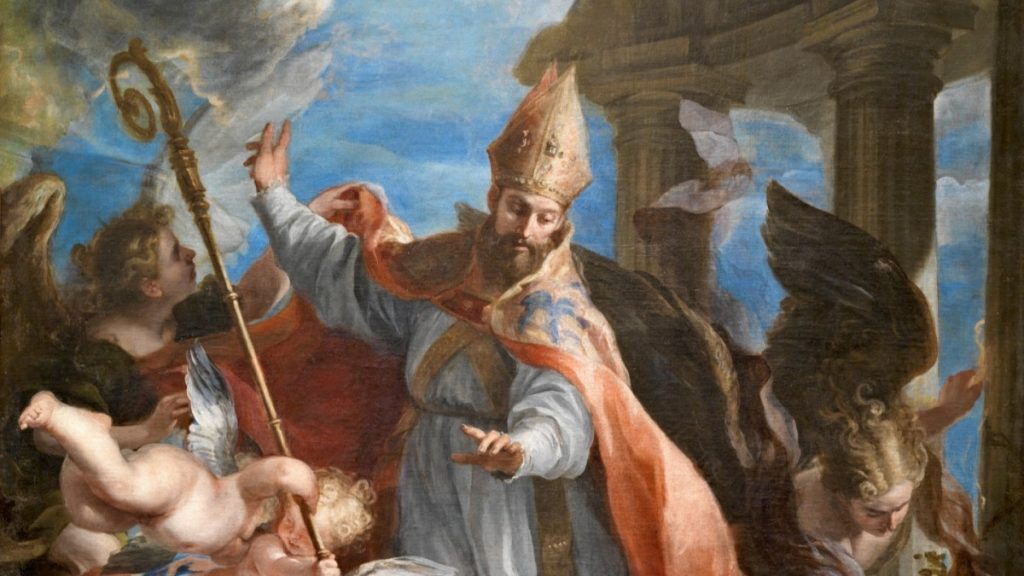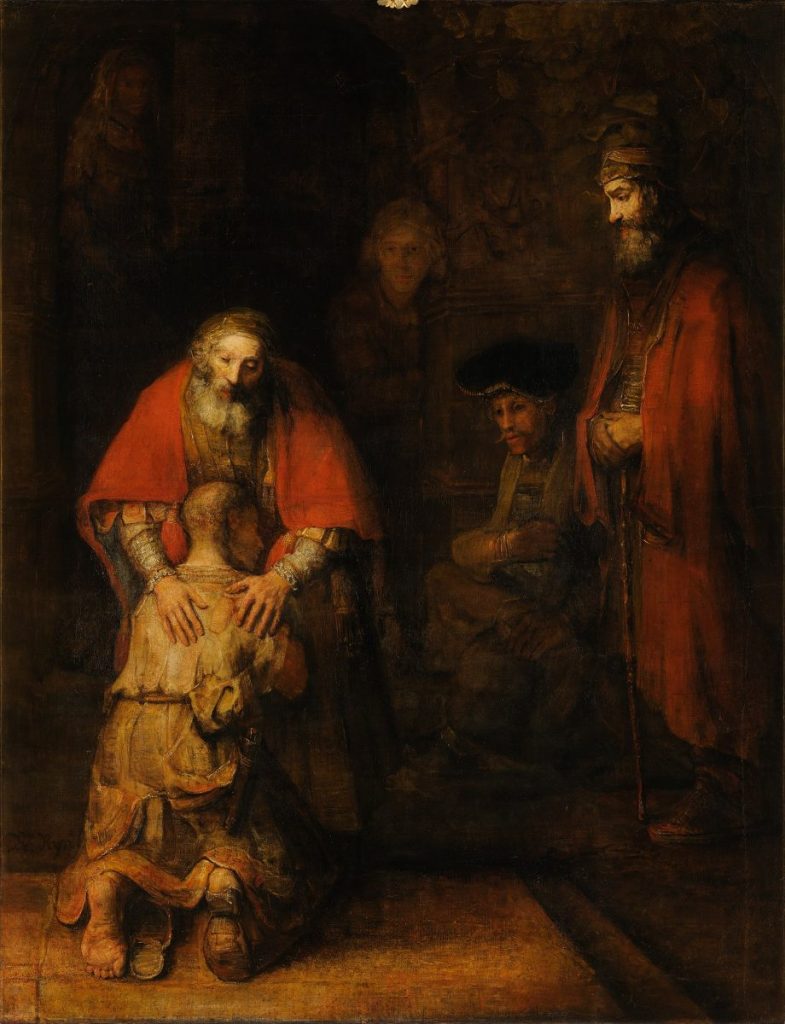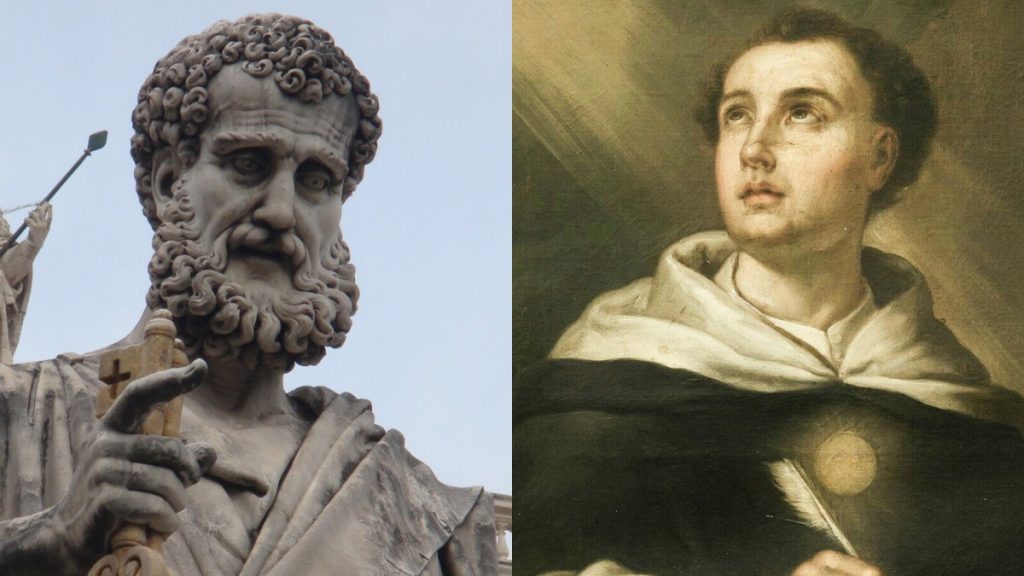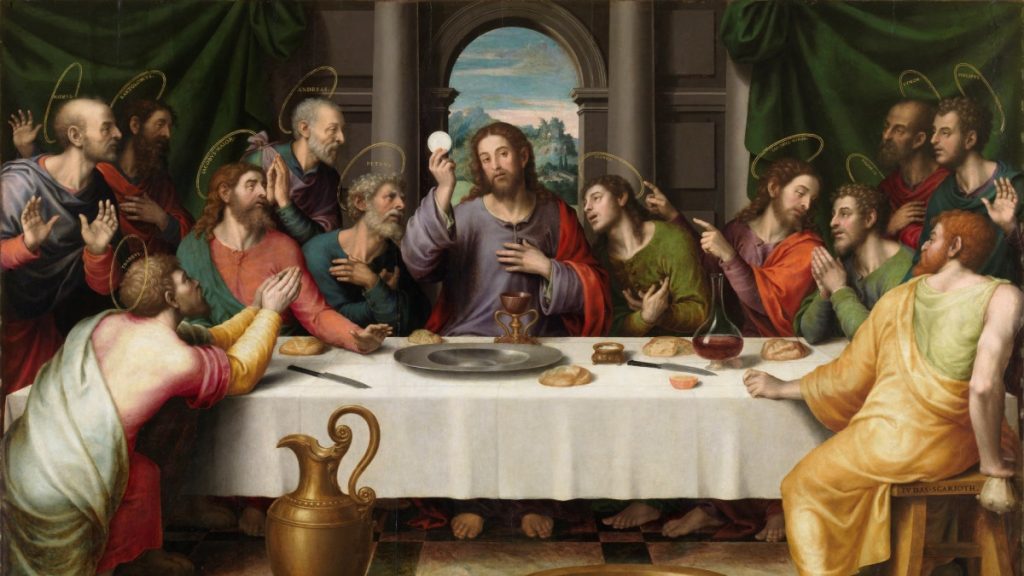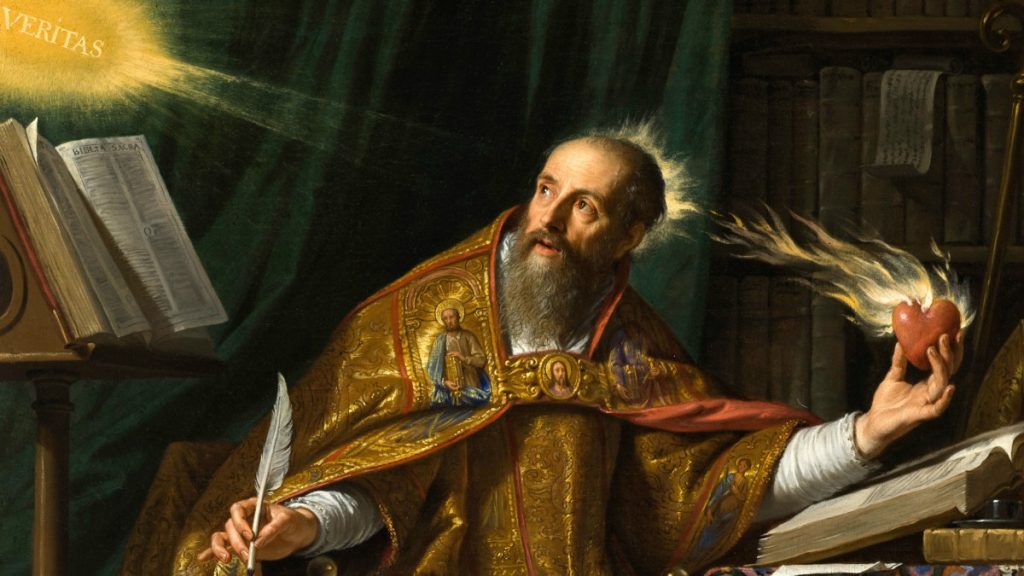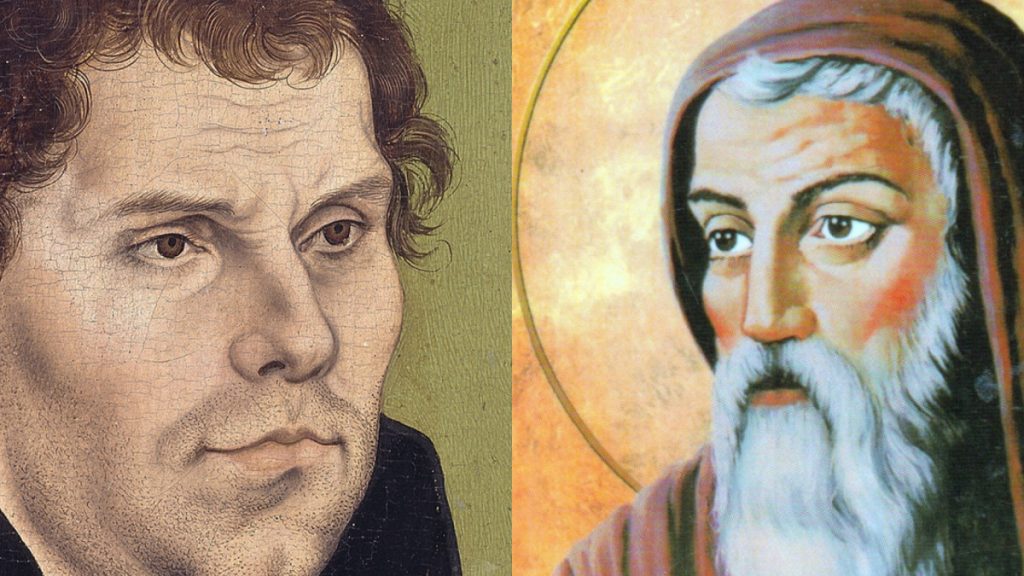(Updated July 17, 2025)
This Author Quote Archive collects pertinent quotes from the Church Father, St. Justin Martyr.
Next to each quote are the Topic Quote Archives in which they are included.
This Quote Archive is being continuously updated as research continues. Quotes marked with “***” have not yet been organized into their respective Topic Quote Archives.
Treatises
St. Justin Martyr, First Apology (c. 151)
- The Sacrament of Baptism | Ch. 61
- The Blessed Sacrament of the Holy Eucharist | Ch. 66
- The Sacrament of Marriage, Divorce, and Contraception | Ch. 15
- Homosexual and Gender-Confusing Behavior | Ch. 27
- The Lord’s Day: Sunday, the New Sabbath | Ch. 67
(Ch. 10) ***
But we have received by tradition that God does not need the material offerings which men can give, seeing, indeed, that He Himself is the provider of all things. And we have been taught, and are convinced, and do believe, that He accepts those only who imitate the excellences which reside in Him, temperance, and justice, and philanthropy, and as many virtues as are peculiar to a God who is called by no proper name. And we have been taught that He in the beginning did of His goodness, for man’s sake, create all things out of unformed matter; and if men by their works show themselves worthy of this His design, they are deemed worthy, and so we have received—of reigning in company with Him, being delivered from corruption and suffering. For as in the beginning He created us when we were not, so do we consider that, in like manner, those who choose what is pleasing to Him are, on account of their choice, deemed worthy of incorruption and of fellowship with Him. For the coming into being at first was not in our own power; and in order that we may follow those things which please Him, choosing them by means of the rational faculties He has Himself endowed us with, He both persuades us and leads us to faith. And we think it for the advantage of all men that they are not restrained from learning these things, but are even urged thereto. For the restraint which human laws could not effect, the Word, inasmuch as He is divine, would have effected, had not the wicked demons, taking as their ally the lust of wickedness which is in every man, and which draws variously to all manner of vice, scattered many false and profane accusations, none of which attach to us.
Concerning chastity, He [Christ] uttered such sentiments as these: “Whosoever looks upon a woman to lust after her, hath committed adultery with her already in his heart before God.” And, “If thy right eye offend thee, cut it out; for it is better for thee to enter into the kingdom of heaven with one eye, than, having two eyes, to be cast into everlasting fire.” And, “Whosoever shall marry her that is divorced from another husband, commits adultery” (Matt. 5:28-29, 32). And, “There are some who have been made eunuchs of men, and some who were born eunuchs, and some who have made themselves eunuchs for the kingdom of heaven’s sake; but all cannot receive this saying” (Matt. 19:12). So that all who, by human law, are twice married, are in the eye of our Master sinners, and those who look upon a woman to lust after her. For not only he who in act commits adultery is rejected by Him, but also he who desires to commit adultery: since not only our works, but also our thoughts, are open before God.
But as for us, we have been taught that to expose newly-born children is the part of wicked men; and this we have been taught lest we should do anyone an injury, and lest we should sin against God, first, because we see that almost all so exposed (not only the girls, but also the males) are brought up to prostitution. And as the ancients are said to have reared herds of oxen, or goats, or sheep, or grazing horses, so now we see you rear children only for this shameful use; and for this pollution a multitude of females and hermaphrodites, and those who commit unmentionable iniquities, are found in every nation. And you receive the hire of these, and duty and taxes from them, whom you ought to exterminate from your realm. And any one who uses such persons, besides the godless and infamous and impure intercourse, may possibly be having intercourse with his own child, or relative, or brother. And there are some who prostitute even their own children and wives, and some are openly mutilated for the purpose of sodomy; and they refer these mysteries to the mother of the gods, and along with each of those whom you esteem gods there is painted a serpent, a great symbol and mystery. Indeed, the things which you do openly and with applause, as if the divine light were overturned and extinguished, these you lay to our charge; which, in truth, does no harm to us who shrink from doing any such things, but only to those who do them and bear false witness against us.
(Ch. 43) ***
We have learned from the prophets, and we hold it to be true, that punishments, and chastisements, and good rewards, are rendered according to the merit of each man’s actions. Since if it be not so, but all things happen by fate, neither is anything at all in our own power. For if it be fated that this man, e.g., be good, and this other evil, neither is the former meritorious nor the latter to be blamed. And again, unless the human race have the power of avoiding evil and choosing good by free choice, they are not accountable for their actions, of whatever kind they be. But that it is by free choice they both walk uprightly and stumble, we thus demonstrate. We see the same man making a transition to opposite things. Now, if it had been fated that he were to be either good or bad, he could never have been capable of both the opposites, nor of so many transitions. But not even would some be good and others bad, since we thus make fate the cause of evil, and exhibit her as acting in opposition to herself; or that which has been already stated would seem to be true, that neither virtue nor vice is anything, but that things are only reckoned good or evil by opinion; which, as the true word shows, is the greatest impiety and wickedness. But this we assert is inevitable fate, that they who choose the good have worthy rewards, and they who choose the opposite have their merited awards. For not like other things, as trees and quadrupeds, which cannot act by choice, did God make man: for neither would he be worthy of reward or praise did he not of himself choose the good, but were created for this end; nor, if he were evil, would he be worthy of punishment, not being evil of himself, but being able to be nothing else than what he was made.
(Ch. 46) ***
But lest some should, without reason, and for the perversion of what we teach, maintain that we say that Christ was born one hundred and fifty years ago under Cyrenius, and subsequently, in the time of Pontius Pilate, taught what we say He taught; and should cry out against us as though all men who were born before Him were irresponsible—let us anticipate and solve the difficulty. We have been taught that Christ is the first-born of God, and we have declared above that He is the Word of whom every race of men were partakers; and those who lived reasonably [“with reason” or “the Word”] are Christians, even though they have been thought atheists; as, among the Greeks, Socrates and Heraclitus, and men like them; and among the barbarians, Abraham, and Ananias, and Azarias, and Mishael, and Elias, and many others whose actions and names we now decline to recount, because we know it would be tedious. So that even they who lived before Christ, and lived without reason, were wicked and hostile to Christ, and slew those who lived reasonably. But who, through the power of the Word, according to the will of God the Father and Lord of all, He was born of a virgin as a man, and was named Jesus, and was crucified, and died, and rose again, and ascended into heaven, an intelligent man will be able to comprehend from what has been already so largely said. And we, since the proof of this subject is less needful now, will pass for the present to the proof of those things which are urgent.
I will also relate the manner in which we dedicated ourselves to God when we had been made new through Christ; lest, if we omit this, we seem to be unfair in the explanation we are making. As many as are persuaded and believe that what we teach and say is true, and undertake to be able to live accordingly, are instructed to pray and to entreat God with fasting, for the remission of their sins that are past, we praying and fasting with them. Then they are brought by us where there is water, and are regenerated in the same manner in which we were ourselves regenerated. For, in the name of God, the Father and Lord of the universe, and of our Savior Jesus Christ, and of the Holy Spirit, they then receive the washing with water. For Christ also said, “Unless you be born again, you shall not enter into the kingdom of heaven” (John 3:5)…
And for this [rite] we have learned from the apostles this reason. Since at our birth we were born without our own knowledge or choice, by our parents coming together, and were brought up in bad habits and wicked training; in order that we may not remain the children of necessity and of ignorance, but may become the children of choice and knowledge, and may obtain in the water the remission of sins formerly committed, there is pronounced over him who chooses to be born again, and has repented of his sins, the name of God the Father and Lord of the universe; he who leads to the laver the person that is to be washed calling him by this name alone…And this washing is called illumination, because they who learn these things are illuminated in their understandings. And in the name of Jesus Christ, who was crucified under Pontius Pilate, and in the name of the Holy Ghost, who through the prophets foretold all things about Jesus, he who is illuminated is washed.
And this food is called among us Εὐχαριστία [the Eucharist], of which no one is allowed to partake but the man who believes that the things which we teach are true, and who has been washed with the washing that is for the remission of sins [baptism], and unto regeneration, and who is so living as Christ has enjoined. For not as common bread and common drink do we receive these; but in like manner as Jesus Christ our Savior, having been made flesh by the Word of God, had both flesh and blood for our salvation, so likewise have we been taught that the food which is blessed by the prayer of His word, and from which our blood and flesh by transmutation are nourished, is the flesh and blood of that Jesus who was made flesh. For the apostles, in the memoirs composed by them, which are called Gospels, have thus delivered unto us what was enjoined upon them; that Jesus took bread, and when He had given thanks, said, “This do ye in remembrance of Me, this is My body” (Luke 22:19; et al); and that, after the same manner, having taken the cup and given thanks, He said, “This is My blood” (Luke 22:20; et al); and gave it to them alone. Which the wicked devils have imitated in the mysteries of Mithras, commanding the same thing to be done. For, that bread and a cup of water are placed with certain incantations in the mystic rites of one who is being initiated, you either know or can learn.
And on the day called Sunday, all who live in cities or in the country gather together to one place, and the memoirs of the apostles or the writings of the prophets are read, as long as time permits; then, when the reader has ceased, the president verbally instructs, and exhorts to the imitation of these good things…But Sunday is the day on which we all hold our common assembly, because it is the first day on which God, having wrought a change in the darkness and matter, made the world; and Jesus Christ our Savior on the same day rose from the dead. For He was crucified on the day before that of Saturn (Saturday); and on the day after that of Saturn, which is the day of the Sun, having appeared to His apostles and disciples, He taught them these things, which we have submitted to you also for your consideration.
St. Justin Martyr, Dialogue with Trypho (c. 155)
- Holy Mary, Mother of God | §100
- The Sacrament of Baptism | §§14, 19, 43
- The Blessed Sacrament of the Holy Eucharist | §41
- The Lord’s Day: Sunday, the New Sabbath | §§18, 21
- Malachi’s Prophecy of the Eucharist in the Church Fathers | §§41, 117
(§§14, 18-19, 21, 41, 43, 100, 117)
(§14) By reason, therefore, of this laver of repentance and knowledge of God, which has been ordained on account of the transgression of God’s people, as Isaiah cries, we have believed, and testify that that very baptism which he announced is alone able to purify those who have repented; and this is the water of life. But the cisterns which you [the Jews] have dug for yourselves are broken and profitless to you. For what is the use of that baptism which cleanses the flesh and body alone? Baptize the soul from wrath and from covetousness, from envy, and from hatred; and, lo! The body is pure…
(§18) …For we too would observe the fleshly circumcision, and the Sabbaths, and in short all the feasts, if we did not know for what reason they were enjoined you—namely, on account of your transgressions and the hardness of your hearts…
(§19) …Wherefore also God has announced that you [the Jews] have forsaken Him, the living fountain, and dug for yourselves broken cisterns which can hold no water. Even you, who are the circumcised according to the flesh, have need of our circumcision; but we, having the latter, do not require the former…
(§21) Moreover, that God enjoined you to keep the Sabbath, and impose on you other precepts for a sign, as I have already said, on account of your unrighteousness, and that of your fathers…
(§41) …Hence God speaks by the mouth of Malachi, one of the twelve [prophets], as I said before, about the sacrifices at that time presented by you: “I have no pleasure in you, says the Lord; and I will not accept your sacrifices at your hands: for, from the rising of the sun unto the going down of the same, My name has been glorified among the Gentiles, and in every place incense is offered to My name, and a pure offering: for My name is great among the Gentiles, says the Lord: but you profane it” (Mal. 1:10-12). [So] He then speaks of those Gentiles, namely us, who in every place offer sacrifices to Him, i.e., the bread of the Eucharist, and also the cup of the Eucharist, affirming both that we glorify His name, and that you profane [it]…
(§43) …And we, who have approached God through Him, have received not carnal, but spiritual circumcision, which Enoch and those like him observed. And we have received it through baptism, since we were sinners, by God’s mercy; and all men may equally obtain it…
(§100) …[Jesus] became man by the Virgin, in order that the disobedience which proceeded from the serpent might receive its destruction in the same manner in which it derived its origin. For Eve, who was a virgin and undefiled, having conceived the word of the serpent, brought forth disobedience and death. But the Virgin Mary received faith and joy, when the angel Gabriel announced the good tidings to her that the Spirit of the Lord would come upon her, and the power of the Highest would overshadow her: wherefore also the Holy Thing begotten of her is the Son of God; and she replied, “Be it unto me according to your word” (Luke 1:38). And by her has He been born, to whom we have proved so many Scriptures refer, and by whom God destroys both the serpent and those angels and men who are like him; but works deliverance from death to those who repent of their wickedness and believe upon Him.
(§117) Accordingly, God, anticipating all the sacrifices which we offer through this name, and which Jesus the Christ enjoined us to offer, i.e., in the Eucharist of the bread and the cup, and which are presented by Christians in all places throughout the world, bears witness that they are well-pleasing to Him. But He utterly rejects those presented by you and by those priests of yours, saying, “And I will not accept your sacrifices at your hands; for from the rising of the sun to its setting my name is glorified among the Gentiles (He says); but you profane it” (Mal. 1:10-12). Yet even now, in your love of contention, you assert that God does not accept the sacrifices of those who dwelt then in Jerusalem, and were called Israelites; but says that He is pleased with the prayers of the individuals of that nation then dispersed, and calls their prayers sacrifices. Now, that prayers and giving of thanks, when offered by worthy men, are the only perfect and well-pleasing sacrifices to God, I also admit. For such alone Christians have undertaken to offer, and in the remembrance effected by their solid and liquid food, whereby the suffering of the Son of God which He endured is brought to mind, whose name the high priests of your nation and your teachers have caused to be profaned and blasphemed over all the earth. But these filthy garments, which have been put by you on all who have become Christians by the name of Jesus, God shows shall be taken away from us, when He shall raise all men from the dead, and appoint some to be incorruptible, immortal, and free from sorrow in the everlasting and imperishable kingdom; but shall send others away to the everlasting punishment of fire. But as to you and your teachers deceiving yourselves when you interpret what the Scripture says as referring to those of your nation then in dispersion, and maintain that their prayers and sacrifices offered in every place are pure and well-pleasing, learn that you are speaking falsely, and trying by all means to cheat yourselves: for, first of all, not even now does your nation extend from the rising to the setting of the sun, but there are nations among which none of your race ever dwelt. For there is not one single race of men, whether barbarians, or Greeks, or whatever they may be called, nomads, or vagrants, or herdsmen living in tents, among whom prayers and giving of thanks are not offered through the name of the crucified Jesus. And then, as the Scriptures show, at the time when Malachi wrote this, your dispersion over all the earth, which now exists, had not taken place.
St. Justin Martyr, quoted by St. Irenaeus of Lyons, Against Heresies (c. 153)
Truly has Justin remarked: That before the Lord’s appearance Satan never dared to blaspheme God, inasmuch as he did not yet know his own sentence, because it was contained in parables and allegories; but that after the Lord’s appearance, when he had clearly ascertained from the words of Christ and His apostles that eternal fire has been prepared for him as he apostatized from God of his own free-will, and likewise for all who unrepentant continue in the apostasy, he now blasphemes, by means of such men, the Lord who brings judgment [upon him] as being already condemned, and imputes the guilt of his apostasy to his Maker, not to his own voluntary disposition…
